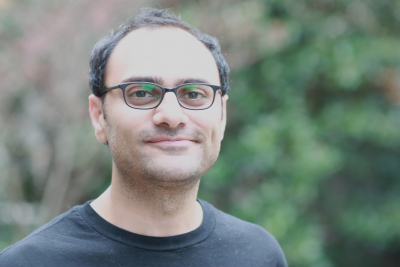Soroush Marouzi, 2023-24 HOPE Center Visiting Scholar

At the center of economics is the belief that people are rational—that they prefer pleasure rather than pain, the easy rather than the difficult, more of a good thing (time, money, choices) rather than less.
But as Soroush Marouzi, a 2023–24 HOPE Center visiting scholar, explains, to really understand the concept of rationality, we first need to understand something even more fundamental than that: human nature itself.
“The essence of human nature is debated from many angles,” Soroush says, “but the one I’m interested in is the debate between intellectualism, which, simply put, argues that people follow their head, and anti-intellectualism, which argues that people follow their heart.”
To put it in more specific terms, intellectualists believe that people carefully assess the costs and benefits of an action before acting; they calculate the potential effects or rewards of an action as they decide what to do. In contrast, anti-intellectualists maintain that people act by habit or on impulse or according to instinct, letting their desires and passions lead the way.
Soroush, a PhD student in history and philosophy of science at the University of Toronto, points out that a multitude of scholars have examined the debate. “But most studies focus only on the contributions of psychologists and philosophers. I’m instead looking at the contributions of philosophers and economists, especially Frank Ramsey and John Maynard Keynes.”
Ramsey, the wunderkind who died suddenly at age twenty-six, was working on a book that was to be titled On Truth. As Soroush examined Ramsey’s papers at Cambridge in connection with the book, it became clear that Ramsey engaged in the debate between intellectualism and anti-intellectualism, forwarding a pragmatist notion of habit.
As for Keynes, “there is definitely an anti-intellectualist strain lurking in the background, especially in the later Keynes. Think about his appeal to animal spirits as the motivational force of human beings,” says Soroush, who completed a master’s degree in economics at the University of New Hampshire.
“And yet, maybe Keynes was, by appealing to animal spirits, expanding what it means to be rational.”
A native of Iran, Soroush was first led to his current project by pondering the following question: How can one act rationally in an uncertain world?
“I was about to cross a busy street in Iran and realized that, yes, a car could actually hit me, but I will cross anyway. I then thought about how we make countless decisions that involve the unknown. Just exactly how do we manage all that?”
For Soroush, the HOPE Center is the perfect place to spend the year. One of his dissertation advisers is Kevin Hoover, who is on the HOPE Center faculty.
Soroush, who also spent 2019–20 as a visiting scholar at the center, has developed his own definition of rationality, one that leans toward the anti-intellectualist camp. “A rational person,” he says, “is one who cultivates the best habits and put those habits into work in the right way in—and here’s the important part—uncertain situations. That’s the account I’m trying to develop based on my reading of Keynes and Ramsey.”
Soroush, who plans to defend his dissertation this fall, will be at Duke until the summer.